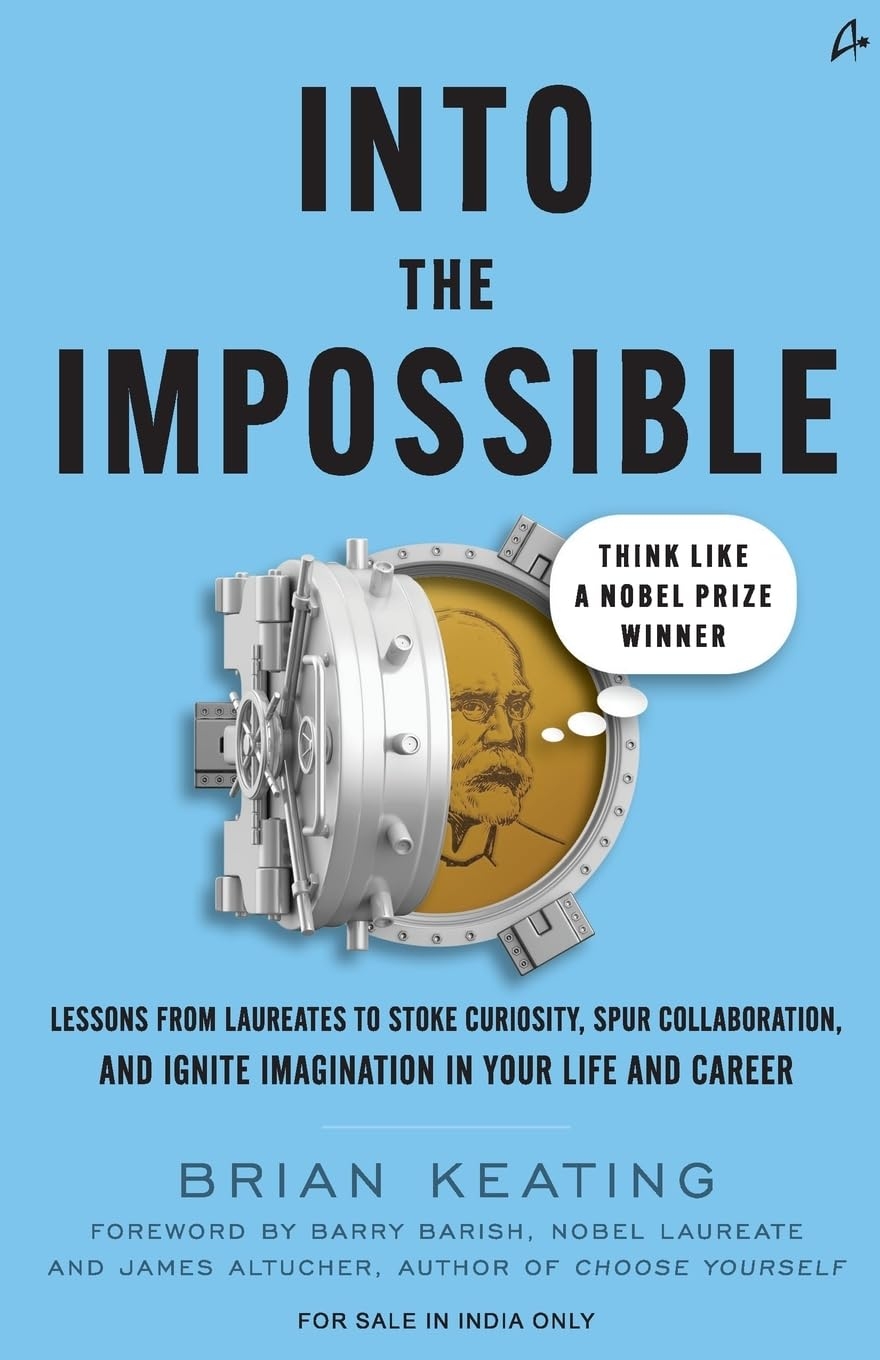Product details
Product description
About the Author
BRIAN KEATING is the Chancellor’s Distinguished Professor at the University of California San Diego and the author of more than 200 scientific publications, two US Patents, and the bestselling memoir ‘Losing the Nobel Prize’. Keating did research at Case Western Reserve University, Brown University, Stanford, and Caltech. In 2007, he received the Presidential Early Career Award for Scientists and Engineers from President Bush. Keating is a Fellow of the American Physical Society, and co-leads the Simons Array and Simons Observatory cosmology projects in Chile. He is a pilot and an honorary lifetime member of the National Society of Black Physicists.
From the Publisher
Into The Impossible: Think Like A Nobel Prize Winner (English)















Nishand Venugopal –
If you are into science communication, maybe this book can open various possibilities of storytelling in which you can creatively discuss with people about the science subjects. Here author, Brain Keating shares some relevant parts of interviews with 9 Nobel laureates in Physics. He also shared his insights about the interview. He tried to make a bridge between physics and philosophy of life by taking the examples of the work and ideas shared by these 9 scientists who managed to reach the pinnacle of professional achievement yet still keep on working to fuel their curiosity. He shares through this why curiosity is necessary to keep up such commendable work by each scientist and their team with examples and notes related to their struggles and failures. Facing imposter syndrome head on and making it sure to readers that it is common and can be countered is another message the author tries through this book. Even these people who won Nobel have faced it and managed to work on it and some still working on it. How collaboration is important for achievements is also mentioned here. Teamwork is important, so is taking risks. As the author’s favourite quote in this book is by Arthur C. Clark hoping “The only way of discovering the limits of the possible is to venture a little way past them to the impossible.”.Hoping this book too will inspire others to look ‘Into the impossible’ with the help of curiosity and creativity. Interesting read.
Brooklyn Bookworm –
Cosmologists are driven by a specific and unique brand of curiosity we can all adopt and gain fromInto the Impossible is a delightful follow-up to Losing the Nobel Prize. Once again, Brian Keating makes what seems impossible for the non-astrophysicist to grasp possible.A friend suggested I read Brian Keating’s first book, Losing the Nobel Prize. Having never read a cosmology or physics book before (beyond whatever was covered in my high school textbooks), I was intimated. But this friend insisted I would find the science approachable and understandable, despite being about subject matter well beyond the topic of books I typically read. I was so glad this friend suggested the book—I enjoyed it so much. As a human in the universe, it felt totally relevant. It was fascinating to learn the evolution of our understanding of the cosmos. The progression of technologies over the centuries and what they’ve enabled scientists to discover, probe, and inspect in and of our universe is enthralling to anyone who’s ever held even an iota of curiosity about what’s beyond our terrestrial experiences.Something that struck me again and again as I read Losing the Nobel Prize was the nature of the mind of a cosmologist. Cosmologists seem, at least to me, to have a special brand of curiosity. One mixed with heaping doses of wonder, optimism, audacity, and fearlessness. I was constantly struck by how different their curiosity is from mine—which is concerned with the material world. And wondered why, when I look up at the stars in awe, I don’t have the audacity and optimism to believe I’m capable of understanding existence in and of the cosmos. What’s different about cosmologists and me, someone who doesn’t work in the sciences? And what might I be capable of if I could throw in some fearlessness and wonder into my curiosity?Lo and behold: Brian has given us Into the Impossible—a book that imparts insight into the inner workings of the cosmologist’s brain. And guess what? Cosmologists—they’re just like us! Well, mostly. In that, despite having enviable intelligence and imagination, they cope with all the same fears, insecurities, and self-doubt as the rest of us. That said, the various interviews between Brian and the Nobel Prize winners he’s included in the book reveal how the singular circumstances of cosmology demand a certain kind of curiosity. Through interviews, Brian is able to reveal patterns of intelligence amongst cosmologists—an intelligence that allows them to persist through the slow, patient, unpredictable work of expanding our understanding of the ever-expanding universe.Cosmologists have no choice but to be humble. And they must be tenacious. This is an interesting combo that can, at face value, look at fundamental odds. But Brian and those he interviews unfold how humility and tenacity are not 1 – 1 = 0. Or even 1 + 1 =2. But they are 1 + 1 = 3. Tenacity + humility unlocks a potent synergy that can yield exponential gains.Cosmologists are dealing with far more unknowns that most of us in careers that pertain to planet Earth must navigate (e.g., who knew dust was such a pesky problem for cosmologists!). This reality, I gleaned from Brian’s sophomore effort, reminds cosmologists to listen to and learn from their critics while never internalizing the criticism. To embrace what they have available today to get to tomorrow’s potential lesson rather than lament any lack today. To find ways to turn competitors into cooperators, working together to meet greater goals, rather than being distracted by the illusion of zero-sum wins or losses. To accept that proving yourself wrong is actually proving yourself competent in winnowing possibilities and moving closer to clarity. To accept a newer, better, and truer concept of the “impossible”—one where we learn to discern what can’t be known or done from what can’t be known or done YET.Those are just a few of the inspiring insights from cosmologists in Into the Impossible. They are shared in plain English. They are relevant to cosmologists and everyone else who’s not a cosmologist. There are lessons here for all readers—no PhD in astrophysics required. Just a stretch of time to take in some wisdom from the cosmos that can be applied to our work and lives here on Earth.
Dan Falk –
A glimpse inside great mindsIt’s tempting to think of science (especially physics and cosmology) as unfolding in its own pristine domain of experiments and equations — but Keating reminds us that scientists are real people with real desires and frustrations. While the selection of scientists profiled could use a bit more diversity, this is still a fascinating look inside some astoundingly creative minds. Plus, as we make our way through the interviews, picture emerges of how science works — not just the “scientific method,” but the down-to-earth realities of practising science in the real world, as told by researchers at the very top of their game. (Keating’s previous book, Losing the Nobel Prize, is also highly recommended.)
Jaume Puigbo Vila –
Como son los fisicos que ganan el NobelConocer como son algunos de los premiados con el Nobel de fisica, lo que los ha motivado o mantenido en su investigacion a pesar de los problemas, siempre es interesante.Hubiese sido mejor si los Nobel hablaran mas y el autor menos al ofrecernos sus comentarios e interpretaciones y podia haber supuesto que el lector es lo suficientemente inteligente para sacar sus propias conclusiones
Pats86 –
InspirationalThis is a short but inspirational book, Brian is a humble author who has learned from these Nobel Laureates.I feel the same way, “To think like a Nobel prize winner” is exactly what you learn from these men.Passion, resilience, humility, collaboration are some of the areas we can learn from.Hope we get a sequel, Brian has interviewed enough Nobel prize winners on his podcast to write another.The Nobel prize needs reform, not taking away any of the winners achievements but some have certainly lost out due to outdated processes. Due to collaboration within science much of what is achieved is down to many individuals who should be recognised. Even the winners say the same thing quite often.Thanks Brian I truly feel inspired from reading this book.
quietlean –
InspirierendDas Buch steckt voller schöner Gedanken und zieht den Schleier, vor den ach so glorifizierten Wissenschaftlern. Es zeigt, was Curiosity für einen Wert hat.